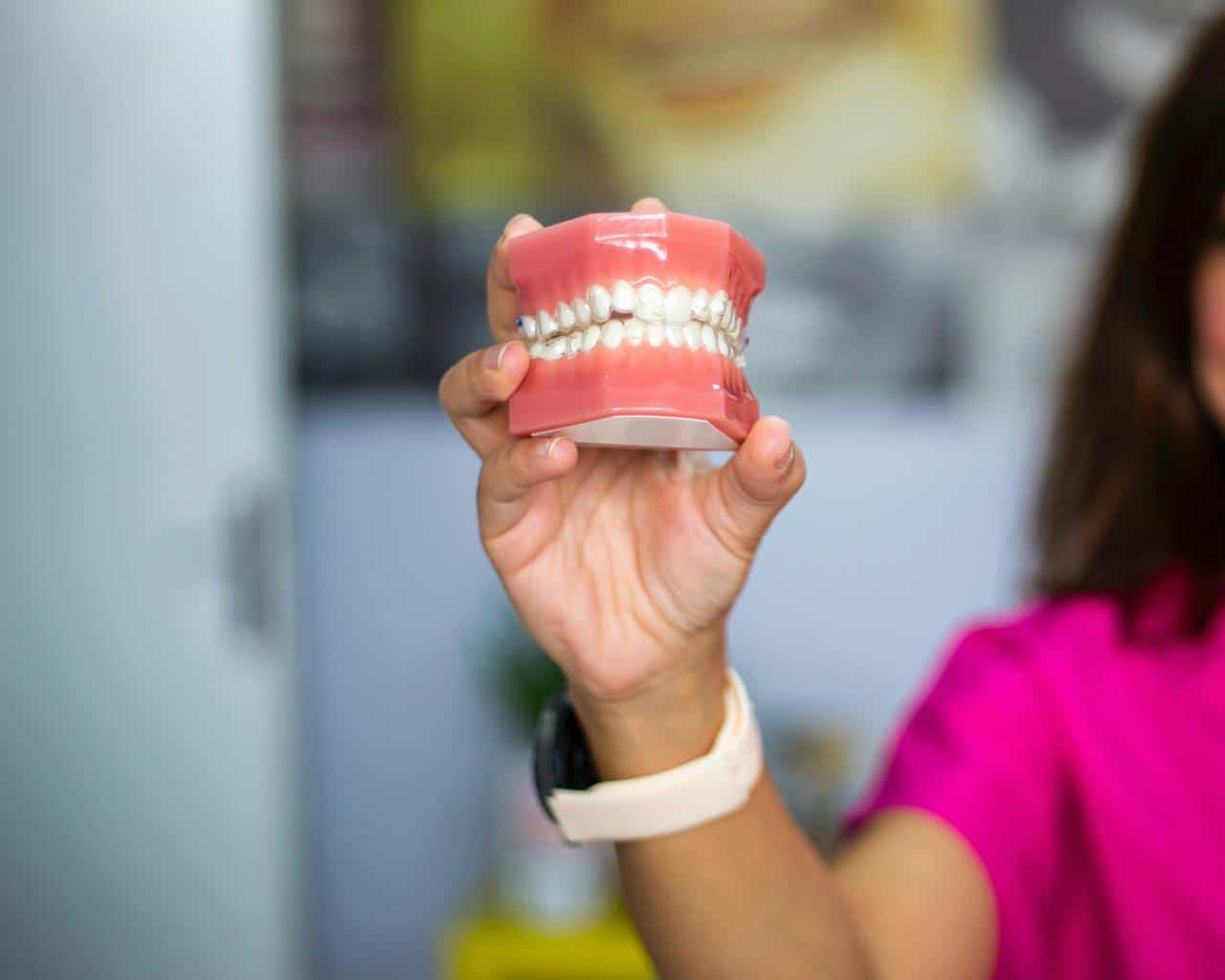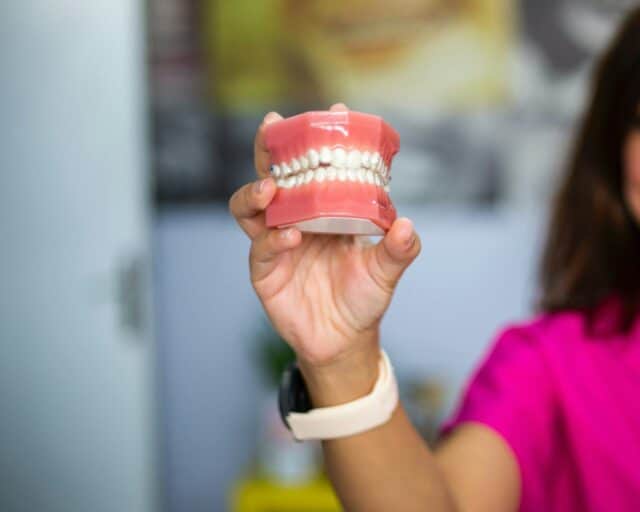Dentures offer a life-changing solution for anyone who has lost natural teeth. They bring back not only functionality but also the confidence and joy of a full, beautiful smile. Yet, proper care is essential to keep them looking and feeling their best. By investing a little time in maintenance, you can ensure your dentures stay comfortable, durable, and reliable for years to come.
One common question from patients who get dentures: How long can you leave dentures in water without any lasting damage? If you are considering getting dentures, here is what you should know about properly caring for your pair.

What Are Dentures?
Dentures are custom-made dental appliances that replace missing teeth and surrounding tissue. Unlike implants, dentures can be removed, which can benefit certain patients. Modern dentures look and feel more natural, appealing to people seeking a cost-effective solution to tooth loss.
Dentures come in a variety of options tailored to different needs. Complete dentures are designed to replace an entire set of teeth, fitting securely over one or both jaws, while partial dentures fill in the spaces left by missing teeth, blending seamlessly with your natural ones.
Each set is custom-made to match the unique shape of your mouth, ensuring a comfortable, secure fit that feels natural. Since they’re removable, dentures require regular care and upkeep to keep them functioning well and feeling great, making your smile as effortless as it is confident.
What Are Dentures Made Of?
Understanding what dentures are made of can shed light on why they require particular care and why soaking is essential. Dentures typically consist of two main parts:
- Acrylic Resin Base: This material forms the “gum” portion of the denture and holds the artificial teeth in place. Acrylic is durable yet slightly porous, which helps it mimic the appearance of natural gums.
- Artificial Teeth: The teeth on a denture are often made from porcelain or acrylic resin. Porcelain offers a more natural look and feel but is more prone to breaking. Acrylic teeth are lighter and slightly more durable but may wear faster than porcelain.
Since acrylic and porcelain have specific care requirements, prolonged exposure to certain elements, such as water, can impact their longevity and appearance. Knowing how to properly store and care for dentures helps preserve their functionality and aesthetic quality.
Can You Leave Dentures in Water?
When dentures are not in use, it’s recommended to leave them in water. Soaking dentures in water helps keep them hydrated, which is essential for maintaining their shape and preventing them from drying out or warping. When dentures dry out, they may become brittle, uncomfortable, and prone to cracking.
However, while it’s beneficial to keep dentures in water when not in use, they should not be left in water for excessively prolonged periods without occasional rinsing. So, how long can you leave dentures in water? Prolonged soaking for more than 12 hours can sometimes lead to a buildup of bacteria or other harmful substances.
To maximize the benefits of soaking, consider the following:
- Use Clean, Cold Water: Lukewarm or cold water is ideal for soaking, as hot water can cause the acrylic to warp. Avoid using tap water if it has a high mineral content, as this may leave deposits on the denture.
- Add a Denture Solution: For an extra layer of cleanliness, use a denture-cleaning solution recommended by your dental provider. This can help remove any residue that plain water alone cannot.
Dentures should ideally be soaked overnight, giving them sufficient time to be cleansed and hydrated without over-soaking, which can compromise their quality.
What Happens If Dentures Are Left in the Water Too Long?
Leaving dentures in water for too long without proper care can have negative effects, including:
- Bacterial Growth: Water is not a disinfectant. When dentures are soaked in plain water for extended periods, bacteria can accumulate on the surface, leading to foul odors and plaque buildup and potentially causing oral health issues when the dentures are worn again.
- Potential Warping: Although dentures require moisture to avoid drying out, excessive water exposure over months without wear may cause slight warping. This can affect the fit of the dentures, making them uncomfortable to wear.
- Deterioration of Materials: Oversoaking in water may weaken the acrylic resin or cause discoloration. Some types of denture materials may become softer or more prone to cracking over time if left continuously in water without maintenance.
To avoid these issues, it’s best to remove dentures from water periodically for cleaning, soak them in a proper denture-cleaning solution, and give them a break from continuous soaking by occasionally allowing them to air-dry in a clean environment.
General Care for Dentures
Caring for dentures goes beyond simply soaking them in water. Following a comprehensive care routine will help dentures last longer and look their best:
- Daily Brushing: Use a soft-bristled toothbrush and denture cleanser to brush all denture surfaces. Avoid regular toothpaste, as it is too abrasive and can scratch the surface.
- Rinsing After Meals: If you’re wearing dentures throughout the day, remove and rinse them after meals to prevent food particles from accumulating, which can lead to bacteria growth.
- Regular Soaking: Soak dentures in a non-abrasive denture-cleaning solution overnight to help remove plaque and odor-causing bacteria.
- Avoid Hot Water: Always use lukewarm or cold water when cleaning and soaking dentures, as hot water can distort their shape.
- Regular Dental Visits: Regular check-ups with your dental provider will help ensure that your dentures fit well and are in good condition, addressing any potential issues early on.
Following these care practices will prolong the life of your dentures and help maintain your oral health.

Visit Archpoint Implant Dentistry for Dentures, Implants, and Other Dental Solutions
Proper care of your dentures is essential for their longevity and comfort. While it’s safe to leave dentures in water when not in use, it’s best to periodically rinse and clean them to prevent bacteria buildup and material degradation. Routine care, such as brushing, rinsing, and regular dental check-ups, can help keep your dentures in optimal condition.
At Archpoint Implant Dentistry, we understand our patients’ needs for flexible and durable dental solutions. We offer personalized guidance on denture care to help you maintain functional and aesthetically pleasing dental health.
Book an appointment with Archpoint Implant Dentistry today for a free consultation to determine whether dentures are right for your needs.








